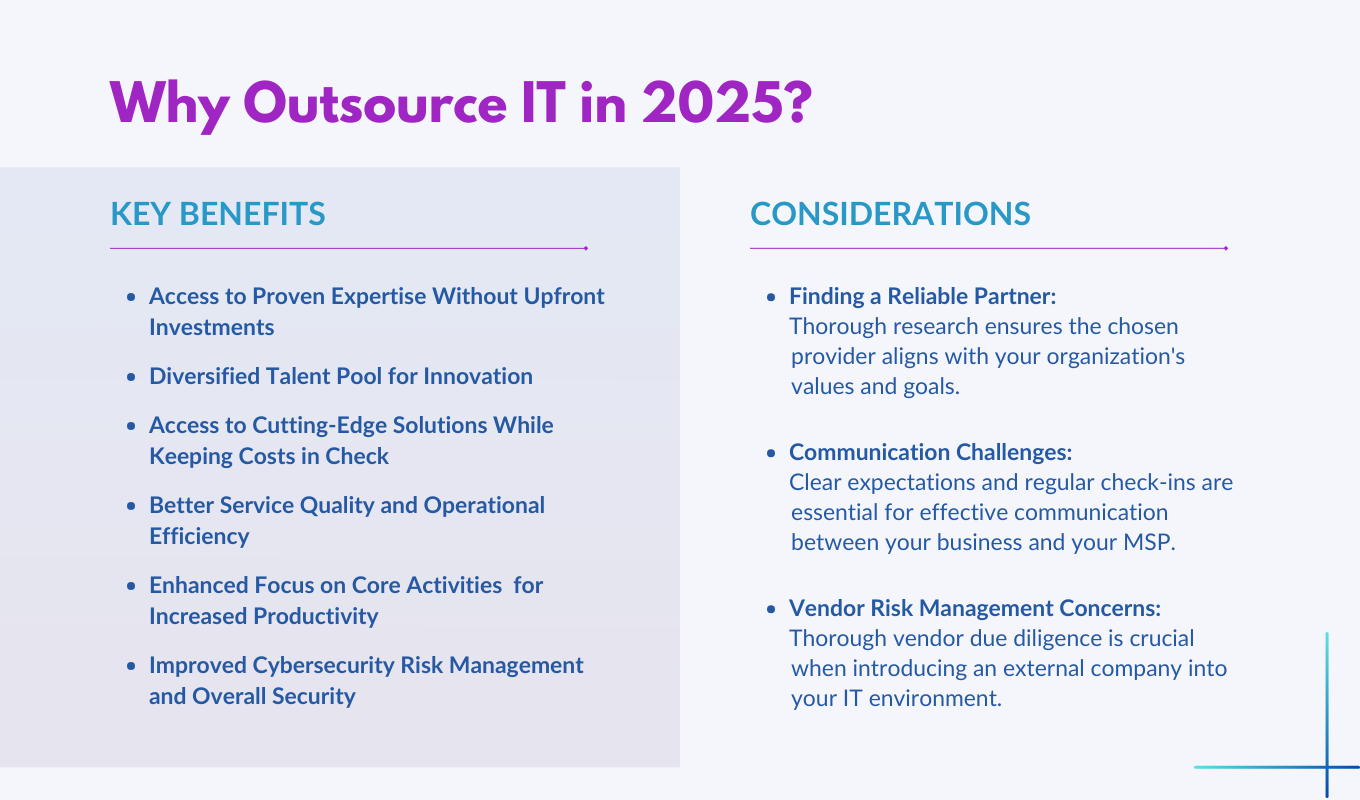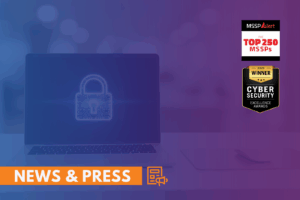IT outsourcing emerged in the 1980s as technology became essential to business operations. While initially seen as a cost-cutting strategy, reputable outsourced IT providers soon showed real value by handling critical functions like infrastructure management, IT support, cybersecurity, and compliance. The trend has far from slowed, with the MSP industry projected to grow 9.3% annually through 2031.
Curious about what drives this shift and the latest IT outsourcing trends? This article explores why more businesses rely on IT outsourcing, either as a supplement to or replacement for in-house teams, along with its benefits and key considerations.
Top IT Outsourcing Trends to Watch
As we enter 2025 and beyond, businesses globally face the challenge of adapting to changing technology and work dynamics. To stay competitive, manage costs, and increase productivity, many organizations are opting for IT outsourcing. Here are the key trends shaping the industry:
Hybrid Work Model
As more and more employees seek flexibility post-pandemic and contemplate job changes due to limited remote options, businesses are adjusting their working styles and planning office redesigns to retain talent, address evolving employee priorities, and facilitate seamless interaction between in-house and remote teams.
However, the adoption of a hybrid work model exacerbates cybersecurity challenges, necessitating robust measures to secure diverse access points in both on-site and remote environments. These challenges are prompting businesses to explore IT outsourcing for specialized solutions to navigate hybrid work and cybersecurity.
Digital Transformation
Companies are turning to MSPs to leverage new technologies such as cloud computing, automation, AI and machine learning, data analytics, the Internet of Things (IoT), blockchain, and other advanced digital tools to enhance their operations.
- Automation & AI Integration: MSPs frequently leverage automation tools to streamline tasks, reduce manual effort, and boost overall efficiency. The integration of AI and machine learning into IT services introduces new potential for improved ticket resolution, significant cost reduction, enhanced cybersecurity, and more favorable contract negotiation terms. Expect 2025 to usher in a surge in automation and AI implementation practices within business software.
- Internet of Things (IoT): IoT, or the Internet of Things, forms a network of interconnected physical devices – smartphones, security cameras, printers, smart sensors, RFID systems, etc. – communicating and sharing data globally. With the IoT market expected to soar from $243 billion in 2022 to $575 billion by 2027, businesses are turning to MSPs to help them adeptly navigate IoT implementation, enhancing processes and customer experience and enabling data-driven decisions for increased revenue.
IT Outsourcing Pros & Cons
Given worldwide adoption rates, outsourcing IT services has proven to deliver a number of strategic benefits to businesses looking to leverage emerging technologies for efficiency and navigate evolving workforce dynamics. But it also requires careful consideration to ensure outsourcing benefits align well with a business’s goals, resources, and budget.

Benefits of Outsourcing IT
1. Cost Efficiency
Outsourcing allows businesses to leverage external expertise without the need for substantial upfront investments in infrastructure, technology, and personnel. This efficient allocation of resources enables companies to focus on core competencies, enhancing overall productivity. Managed IT support services are inherently flexible, meaning organizations can adapt their IT capabilities based on fluctuating demands, scaling up easily during growth periods. This scalability ensures that businesses only pay for the services and resources they require, optimizing budget utilization and promoting a responsive and agile operational model.
2. Talent Reserve
Outsourcing IT provides access to a diverse talent pool, allowing businesses to tap into a range of specialized skills and expertise that would otherwise be difficult to access or recruit internally. This diversity fosters innovation and problem-solving, as teams bring varied perspectives and approaches to technology challenges.
3. Access to the Best Technologies
Managed services providers are typically equipped with the latest technologies and tools. This means that companies can benefit from cutting-edge solutions without the need for substantial upfront investments in technology upgrades. While significant infrastructure upgrades and toolsets are often cost-prohibitive for singular businesses, outsourced IT providers have greater scale and expertise and can more effectively and efficiently incorporate new and emerging resources into their existing tech stacks and service offerings.
4. Better Service Quality & Efficiency
Specialized outsourcing providers focus on delivering specific services with a high level of expertise. This specialization often results in improved service quality and efficiency as compared to managing the same tasks in-house. Particularly as complex IT issues arise, businesses can leverage round-the-clock IT support partners and rapidly escalate issues when needed – rather than hiring, training, and maintaining 24×7 teams in-house.
5. Increased Productivity
Outsourcing technology functions, including IT administration, cybersecurity prevention and response, and even regulatory compliance, allows internal teams to concentrate on fundamental business activities. This emphasis on core competencies frequently results in heightened productivity, as employees can channel their energies toward strategic objectives.
6. Improved Cybersecurity Risk Management
Reputable managed security services providers (MSSPs) invest in robust security measures to protect their customers’ data and systems. This can enhance the overall security posture of a company, particularly when dealing with sensitive information and critical business processes.
Critical Considerations for Outsourcing IT
- Finding a Reliable Partner: One of the challenges in IT outsourcing is finding a reputable partner to hand over control of critical business processes. Relying on managed services providers means putting a significant portion of the business in the hands of a third party. Any issues with the MSP, such as financial instability or operational problems, can directly impact your organization. For these reasons, companies must conduct thorough research to ensure that the provider they choose has a proven track record and solid references and aligns with the organization’s values and goals.Not sure what qualities to look for in an MSP? Read this article about the Key Considerations for Selecting a Managed Services Provider.
- Communication Challenges: By removing a core function of your business from within, communication can easily become a challenge, particularly if you don’t set clear expectations with your MSP. Incorporating regular check-ins, encouraging open dialogues, and leveraging collaborative tools can prove invaluable in enhancing effective communication between a business and its outsourced IT partner. This approach not only ensures everyone is on the same page regarding daily roles and responsibilities, but also facilitates the quick resolution of communication challenges when complex challenges arise.
- Vendor Risk Management Concerns: Outsourcing IT involves inherent security risks since you’re introducing an external company into your internal technology environment. For that reason, organizations looking to outsource their IT should meticulously choose a service provider with a demonstrated commitment to robust security practices.Performing thorough vendor due diligence is an essential element of any third-party relationship. Before engaging with an MSP or MSSP (and routinely throughout your relationship), make sure you ask critical questions about a vendor’s security protocols, governance policies, access control, and more. You are ultimately accountable to your own clients, stakeholders, and regulators, and, as such, must demonstrate that you’ve carefully evaluated any outsourced providers before introducing them into your environment.
YOUR TRUSTED PARTNER FOR PROVEN IT SOLUTIONS
With more than two decades of experience as an award-winning MSP and MSSP, Omega Systems delivers personalized IT services and provides the confidence, security, and flexibility your business needs to thrive. Choosing Omega goes beyond immediate problem-solving – it means connecting with proven expertise, cost-effective solutions, cutting-edge technologies, and a genuine commitment to securing your digital world.
Connect with our team today to learn more about our portfolio of managed IT services and start exploring customized solutions for your organization.


